| Title |
Summary |
Newsletter item # |
| Introduction |
|
Although the funding for N2Africa ended in June 2019 we are still busy with reports, impact studies and scientific papers. In November, the IITA N2Africa team received an award from the Board of Trustees of IITA Award for Excellence for Outstanding Team in 2019, recognising the excellent work done over the past ten years to promote nitrogen fixing grain legumes in Africa. Congratulations to our colleagues for this important recognition.
Photo: IITA DG Dr Sanginga presenting the Board of Trustees Excellence for Outstanding Team Award to Freddy Baijukya, Bernard Vanlauwe and Nkeki Kamai, with Hilde Koper, Master of Ceremonies.
|
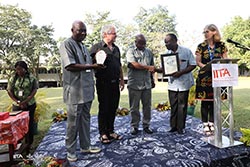 |
|
1 |
| Verifying contribution claims |

Giel Ton at Contribution Analysis brainstorm session at Wageningen University in February 2019 |
N2Africa has gathered and monitored a lot of information about the impact of its work. However, the diversity of N2Africa’s interventions, their dynamism, and the widely different contexts where these have been implemented, make it tricky to derive strong inferences about the project’s impacts from suvey-based impact evaluations. ...
|
|
2 |
| N2Africa Policy recommendations reports advocacy follow-up in Ethiopia and Tanzania |
|
N2Africa organised two policy advocacy activities in Tanzania and Ethiopia, between October 2018 and May 2019. Following the policy recommendation workshops in Addis Ababa on 3 May and in Iringa on 8 May, the two policy recommendations reports are now finalised, and follow-up activities by the N2Africa country coordinators are ongoing. In Tanzania there is much interest by politicians to support soyabean for livestock production. ...
|
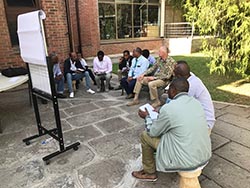
Policy workshop Ethiopia 3 May 2019 |
|
3 |
| Can we trust land area estimates? |
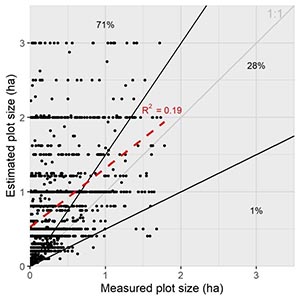 |
I expect that many readers of the N2Africa podcaster would readily answer ‘no’ to that question. However in spite of knowing that land area estimates can be unreliable, N2Africa and other agricultural development projects often rely on estimates of plot areas, and that on top of estimates of crop yield. We may have no other choice if we want a lot of data, preferably for multiple (past) seasons, for several crops in different countries. |
|
4 |
| Evaluation of the Productivity and Profitability of Soyabean (Glycine max [L.] Merr.) Production Technologies in the Nigerian Savannas |
| Soyabean is an important crop in Nigeria, that has gradually evolved to be a crucial cash crop for rural households in the Nigerian Savannas due to its rising industrial demand. Nigeria is the second largest producer of soyabean after South Africa producing 700,000 Mt of soyabean per year. Despite its growing importance in the Nigeria savannas, soyabean yields are low due to several production constraints including poor soil fertility with emphasis on phosphorus, intermittent drought and low biological nitrogen fixation by adapted varieties. This study was carried out to assess the effect of integrated input management systems on productivity of soyabean in the Nigeria savannas. |
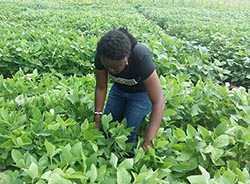
Rainfed soyabean with integrated input bundle (S+P+M+I) that is Supplementary irrigation + Phosphorus fertilizer+ Manure + Inoculant |
|
5 |
| Genetically diverse microsymbionts belonging to novel and other defined symbiovars are responsible for cowpea root nodulation in Northern Mozambique |
|
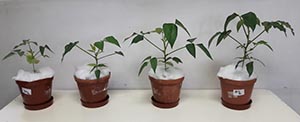
Cowpea plants inoculated with different rhizobia strains isolated from cowpea root nodules sampled from farmers fields in Northern Mozambique
|
Cowpea is an important food legume that is well-adapted to the semi-arid regions of the tropics. The bacteria nodulating cowpea exhibit a large diversity which has been reported in different regions of the world. Little is known about the rhizobia nodulating cowpea in Mozambican soils. In this study ERIC-PCR was used to characterise cowpea rhizobia. This method allowed us to distinguish 20 groups at a similarity level of 20%, indicating a high genomic diversity for the native rhizobial populations in the two agroecological zones. Many reports have shown that there are more rhizobial types in tropical and subtropical than temperate regions. Therefore, studies of rhizobial diversity in tropical environments such as Mozambique could lead to the discovery of diverse rhizobia with interesting traits for use in agriculture. ... |
|
6 |
| N2Africa publications |
- Intermediate Maturing Soybean Produce Multiple Benefits at 1:2 Maize:Soybean Planting Density by Margarida G. Simbine, Frederick P. Baijukya and Richard N. Onwonga;
- Inoculation and phosphorus fertilizer improve food-feed traits of grain legumes in mixed crop-livestock systems of Ethiopia by Sisay Belete, Melkamu Bezabih, Birhan Abdulkadir, Adugna Tolera, Kindu Mekonnen, Endalkachew Wolde-meskel;
- Co-design of improved climbing bean production practices for smallholderfarmers in the highlands of Uganda by Esther Ronner, Katrien Descheemaeker, Conny Almekinders, Peter Ebanyat, Ken E. Giller;
- Which options fit best? Operationalizing the socio-ecological niche concept by Descheemaeker, K., Ronner, E., Ollenburger, M., Franke, A.C., Klapwijk, C.J., Falconnier, G.N., Wichern, J., Giller, K.E.;
- Poor farmers - poor yields: socio-economic, soil fertility and crop management indicators affecting climbing bean productivity in northern Rwanda by Franke, A. C.; Baijukya, F.; Kantengwa, S.; Reckling, M.; Vanlauwe, B.; Giller, K. E.;
- PhD Thesis Participatory approaches to diversification and intensification of crop production on smallholder farms in Malawi by Daniel van Vugt;
- PhD Thesis Enhancing biological nitrogen fixation and yield of soybean and common bean in smallholder farming systems of Rwanda by Edouard Rurangwa.
|
7 |
| Reports and other output uploaded on the N2Africa website |
|
8 |
| N2Africa in the news |
FCRN linked to The story of N2Africa in their Fodder entry.
|
9 |
| Related newsletters |
|
10 |
|
|







